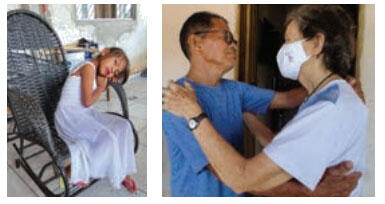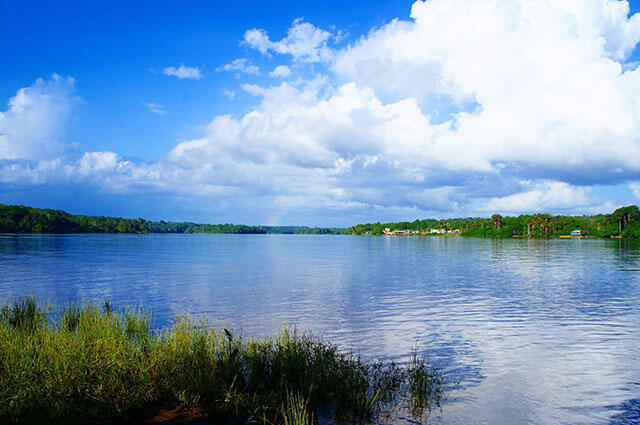
The jungled Oiapoque River meanders along the Brazil-French Guiana frontier in Amapá, Brazil.
When a Bird Sings Backward
If in any of the last 44 years along the jungled rivers of the Brazil-French Guiana frontier, you were to see an open, outboard, aluminum-bottomed boat making way, you would more than likely notice on the boat’s nicked and worn benches, among the many brown faces set against the wind, one fair one, and it would be Sister Rebeca Spires, SNDdeN.
You would see her in the equatorial rivers like inland seas where the sun blazes top-down and sideways off the water, and in the narrow rain-drenched creeks with alligators sizing up the passing boat. These are long journeys, five hours if not more, and Sister Rebeca knows them well. She knows the grandparents, parents and children in the passing, stilt-raised villages. She knows the surfacing fish that nose to tail are longer than the boat. She knows the push and pull of the tides that determine when and where you go.
It’s a place where time to a destination isn’t so much measured in distance as in the height of the tide and an engine’s horsepower.
All told, Sister Rebeca has worked among four indigenous peoples settled in scores of villages on four rivers, seven creeks and one road. It’s a place where time to a destination isn’t so much measured in distance as in the height of the tide and an engine’s horsepower. Some villages are the size of a town, some only a few families. In the rainy season, when it’s ‘big water’ as Sister Rebeca calls it, a boat can navigate among the houses. In the dry season, logs lay as boardwalks over the spongy ground. In either season, Sister Rebeca continues her life’s ministry. Sister Rebeca is well known for her work phoneticizing indigenous languages. It was the beginning of her work in the Amazon, and when she was a young woman. But it has not been her only work, nor does she consider it her most important. But more on that in a moment.
For now, see her as that young woman — born in temperate Ohio, a school teacher — transplanted into jungle and heat and water. She had come to Brazil in 1970 to work with Sister of Notre Dame de Namur Dorothy Stang. They were in the state of Pará. Then, and because she was a teacher, she was invited north where there was much discontent with government-sponsored education. “The chief of the village,” says Sister Rebeca, “he said, ‘These teachers that come in from the government, and teach in the schools, don’t respect my children. They say they’re dumb … They don’t get it that they are speaking a language [Portuguese] and my children don’t understand what they’re saying. So how can they learn to read it if they don’t understand? And so could somebody come in? Could you get somebody to put our language in writing so we can have our own books?’ And that’s what I was invited to do. So to do that, of course, I lived with them. And I did everything they did with them.”
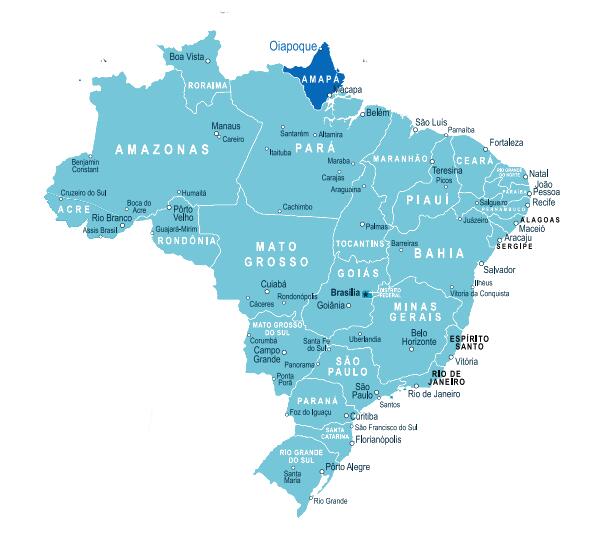 |
| Oiapoque is in the state of Amapá in northern Brazil. |
“So to do that, of course, I lived with them. And I did everything they did with them.” —Sister Rebeca
The village was Espirito Santo, a Karipuna village and an hours-long boat ride from the nearest municipality. And to that municipality — Oiapoque — there was at the time no road. Instead, the Brazilian Air Force flew in supplies on amphibious World War II-era Douglas C-47s, landing and taking off on the Oyapock River. And on such a C-47 Sister Rebeca hitched a ride. Then, at Oiapoque, where she is based to this day, she traveled by canoe to Espirito Santo.
There was only one house in Espirito Santo having four walls, and that’s the house the village gave her. All the other houses had but one wall, always positioned to block the rain. And it rained all the time, so much so that the houses, including Sister Rebeca’s, rested on stilts. Nowhere in the village was there electricity. And it was from here, Sister Rebeca’s teaching of the people, and their teaching of her, began. “First I had to learn to talk,” she says. “So I went to the fields with them. They taught me in the cassava fields, in the sweet potato fields. Then, in the evening, you sat around the fire or around the kerosene lamp on the table, and told stories. So it was not hard to learn.”
Sister Rebeca as well witnessed the villagers’ daily lives, their spirituality, their means of survival. She learned that in times of ‘big water’, the villagers shifted their diet from fish to game, because as the water rose it drove animals onto smaller and smaller islands, where they could be hunted. Conversely, when the water was down, fish became concentrated in the narrowing rivers and creeks. She saw fish so long they had to be harpooned, and alligators hunted with those same harpoons.
She heard stories of what nature had to say, if only a person listened, such as when a bird sings backward. “Do you think that’s superstitious?” asked a villager.
She heard stories of what nature had to say, if only a person listened, such as when a bird sings backward.
“No,” said Sister Rebeca. “It’s what you have learned of God through nature.” In the little wooden house Sister Rebeca remained in Espirito Santo two years, living in the ‘little wooden house,’ as she calls it. One of the walls didn’t come to the house’s corner, so that from the back of the house she could reach to a graviola tree, for its large spikey fruit. In the middle of the one room sat a table, and nearly every day for those two years 10 young villagers, ones who had learned Portuguese, sat with Sister Rebeca. Together, they teased, coerced and corralled an amalgamated and unwritten language of indigenous words, French Creole, Portuguese and even African Bantu into the rules and phonetics of Latin letters. In some cases, they imported words that to date had no reason to exist.
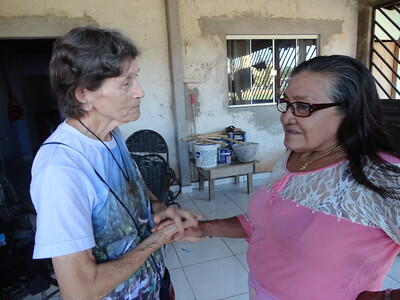 |
|
“They didn’t have a word for windows,” says Sister Rebeca, “because they didn’t have windows in their houses.”
Once the language was coupled to an alphabet, the village had a means to translate books into their own language, and to write their own books, allowing for effective education, which was the first objective. It also, according to Sister Rebeca, provided a tool whereby people in the village and other villages could collaborate for mutual benefit, such as in cooperatives and commerce. Long term, the alphabet has enabled organizing and participation in Brazil’s democracy, abilities that have over the years, as commercial interests edge closer, become vital to the villages’ continued way of life.
This, though, was long in the future as Sister Rebeca and the 10 young people worked in the little wooden house. Sometimes, Sister Rebeca recalls, they broke from work, went to where the wall ended, and where the graviola tree rose closely. They’d eat the fruit, look into the jungle, and just talk.
“It was very healthy, free and honest,” she says. A bigger picture Since those first two years, Sister Rebeca has traveled to all the villages along the rivers and the one road. She assists with the alphabet still, and with advocacy, and with religious activities and formation. Then, once again, she is out on the water.
But a lot is changing. Technology has allowed in outside customs, some not helpful. A gold rush just over the Oyapock has brought new people to the area, and has drawn villagers away. Mining and timber interests move ever closer. Whereas in her younger years Sister Rebeca worked to better integrate indigenous peoples into the wider world, now she worries such integration, if not done with prudence, will endanger them. And this is where her work now lies. “This means more than the alphabet to me,” she says. She acknowledges the dangers from without – the loggers and miners, the changes in rainfall, the antipathy of government. But she worries too about changes from within. There is electricity now in many of the villages, and there are cell phones and televisions.
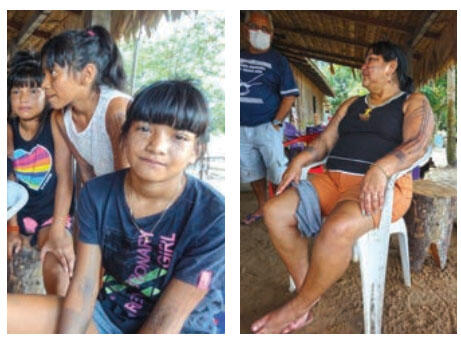 |
| These girls and woman, adorned with genipapo drawings, are members of the
Kyikatejê people in Pará, Brazil. |
The houses have four walls, and doors that lock. And there is the concept — and the possession of — money. All of these can be seen as good, but together and combined with new standards of behavior infiltrating from the larger world, they represent a challenge to the villages’ traditional way of life. Gone are the days, says Sister Rebeca, when wealth was measured in alligators, fish, water turtles and things you could hunt. “Money just wasn’t part of it,” she says. “Now, some have more, some have less. And that makes a difference.” In the face of such change, Sister Rebeca meets with chiefs and is invited to chiefs’ councils. She urges unity in the face of outside threats. The villages have a right to their territory, she says, but they also have a right to their customs. “Maintain the culture alive,” she tells them. “Don’t go backward, but you have to bring with you that which is of great value.
“If you let go what your ancestors taught you,” she says, “you will not be Indians anymore. And those things they taught you, that’s what Jesus teaches you. To share what you have. The working together. The deciding together. To love one another. To respect one another. To help one another. We don’t look for enemies; we look for brothers and sisters. “Don’t lose yourself!” she says.
“[Indigenous peoples] …are very close to nature …They know God in nature. They share everything. So there's a basic goodness there.” —Sister Rebeca
Still on the water At 80, Sister Rebeca still plies the waterways. She climbs in boats and balances on logs. She often sleeps in a hammock. Her age, and perhaps more importantly, her longevity in the work, have earned her respect in all the villages. Her opinion is sought, and valued. “I’m like an old grandmother figure. I’ve come to this venerable old age, and that’s very respected,” she says. “But it brings with it more responsibility because I know I’m being heard.” Sometimes in the boats, the jungle passing, the smell of the water, among the trees she loves — she thinks of trips past, and years past. She thinks of her friend Dorothy Stang, SNDdeN and when they would sit side by side on a tree root deep in the forest, and pray. She thinks of the 10 young people at work in the little wooden house, and of the graviola tree that handed them lunch. She thinks of canoe trips extending into the night, at times in the rain, and of the eyes of the animals watching. “I think in images, like films,” she says. “I have a head full, and I’ll probably be playing those films in my head forever.”
First Published in Cross Currents Magazine, WINTER/SPRING 2023 VOLUME 19, ISSUE 1
With you, we change lives
With the support of generous friends like you, we are able to continue our mission of educating and taking a stand with those in poverty— especially women and children.
This site provides information using PDF, visit this link to download the Adobe Acrobat Reader DC software.

